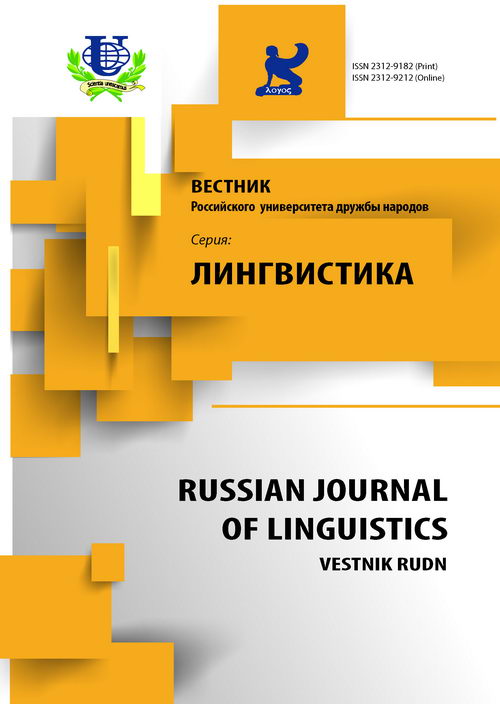No 3 (2010)
- Year: 2010
- Articles: 13
- URL: https://journals.rudn.ru/linguistics/issue/view/589
Articles
 5-8
5-8


Normative conservatism against language fashion
Abstract
The author of the article gives reasonable grounds for the conscientious and critical attitude to language innovations. It is the purpose of the article to show how groundless fashions in language violate the stylistic norms and speech etiquette. To preserve the codified norms is an optimum condition for the existence of the literary language.
Russian Journal of Linguistics. 2010;(3):9-14
 9-14
9-14


 15-22
15-22


 23-29
23-29


Ways of forming the invective lexis (based on the Peninsular national variant of the Spanish language and the American national variant of the English language)
Abstract
The article analyses the main sources of enriching the invective vocabulary in the Peninsular national variant of the Spanish language and the American national variant of the English language: revaluation of the lexical material of the literary language, interaction with the non literary sphere of the language, and foreign borrowings.
Russian Journal of Linguistics. 2010;(3):30-37
 30-37
30-37


 38-45
38-45


 46-49
46-49


 50-53
50-53


 54-60
54-60


On language representation of spacial concepts
Abstract
The paper is dedicated to language representation of spatial concepts nominating specific areas of land (the names of bogs) in modern English. The author pays special attention to the role of perceptual features within the semantic structure of these concepts which constitute such basic ontological category as space.
Russian Journal of Linguistics. 2010;(3):61-68
 61-68
61-68


Paradigmal approach to research of concept «language situation»
Abstract
In the present article the concept «language situation». This concept is based on paradigmal approach in conditions of poliethnical region (Irkutsk region). This makroconcept include the sociolinguistic and linguocultural concepts. Their subject of research defines the volume of concept «language situation» and individual aspect of regional language situation.
Russian Journal of Linguistics. 2010;(3):69-76
 69-76
69-76


 77-81
77-81


Our autors
Russian Journal of Linguistics. 2010;(3):82-83
 82-83
82-83
















